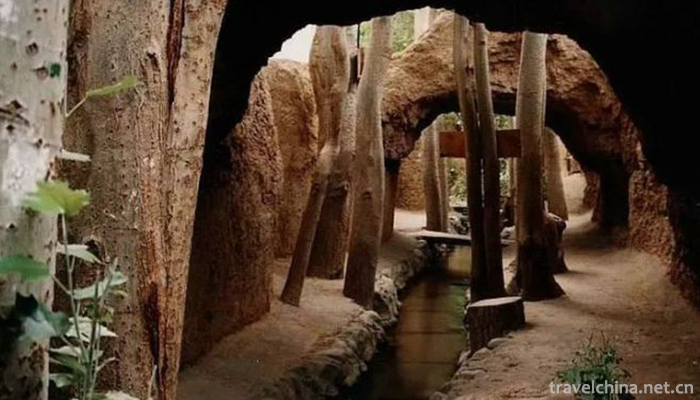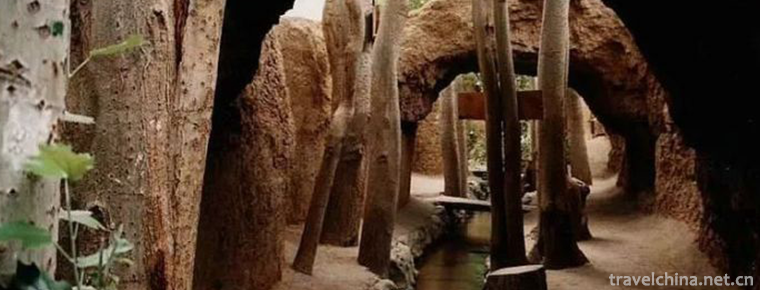Cutting Skill of Kaner Well
Cutting Skill of Kaner Well
Kanerjing is the meaning of "well hole". It has been recorded as early as in Historical Records. It is called "well canal", while Xinjiang Uygur language is called "Kanerzi". Kanerjing is a special irrigation system in desert areas, which is widely used in Turpan, Xinjiang, China. Kanerjing, together with the Great Wall and the Grand Canal of Beijing and Hangzhou, is known as the three major projects in ancient China. The total number of Kaner wells in Turpan is more than 1100, with a total length of about 5000 kilometers. On November 11, 2014, the drilling technique of Kanerjing was approved by the State Council and listed in the fourth batch of representative projects of national intangible cultural heritage.
brief introduction
Kanerjing, which means "well hole", is called "Kanerzi" in Xinjiang Uygur language. Kanerjing is a special irrigation system with ingenious structure in desert areas, especially in Turpan, Xinjiang. It is called the Three Great Projects of Ancient China with the Great Wall and the Grand Canal of Beijing and Hangzhou. The total number of Kaner wells in Turpan is more than 1100, with a total length of about 5000 kilometers.
2. Structural Principle
Kaner well is an ancient horizontal catchment structure for groundwater development and utilization. It is suitable for foothills and alluvial fan margins, mainly for intercepting underground diving for farmland irrigation and residential water use.
The structure of Kaner well is composed of four parts: vertical shaft, underground channel, surface channel and "waterlogging dam" (small reservoir). Bogda Mountain in the north of Turpan Basin and Karawucheng Mountain in the West are covered with snow and rainwater in spring and summer, which dive into the Gobi beach. By using the slope of the hill, people ingeniously created Kaner wells to divert underground subsurface flow to irrigate farmland. Kaner well does not evaporate a lot of water because of hot and strong wind, so the flow rate is stable and self-flow irrigation is guaranteed.
3 role
The reason why Kanerjing was built in large numbers in Turpan Basin is inseparable from the local physical and geographical conditions. Turpan is one of the extremely arid areas in China, with annual precipitation of only 16 mm and evaporation of up to 3000 mm, which can be called the "dry pole" of China. However, Kaner well is an underground underground canal water conveyance, not affected by season, wind and sand, small evaporation, stable flow, can be perennial self-flow irrigation.
It is precisely because of this unique underground water conservancy project, which leads the underground water to the ground and irrigates hundreds of thousands of mu of good fields in the basin, that the Turpan people of all nationalities were bred and the desert became an oasis.
On November 11, 2014, the drilling technique of Kanerjing was approved by the State Council and listed in the fourth batch of representative projects of national intangible cultural heritage.


-
2.Four Seasons Hotel Guangzhou
Four Seasons Hotel Guangzhou is located in Guangzhou International Finance Center on the 103th floor of Zhujiang New Town, the financial center of Guangzhou, at the top of this modern landmark.
Time 2018-12-16 -
3.Site of XanaduTime 2018-12-23
-
4.Hainan Tropical Wildlife Park and Botanical Garden
Hainan Tropical Wildlife and Botanical Garden is a national AAAA-level tourist attraction with the theme of popular science exposition, conservation and reproduction, sightseeing, leisure and vacation
Time 2019-01-13 -
5.Jindian Scenic Spot
Kunming Golden Palace Scenic Spot, also known as Tongwa Temple, is made of brass and shines in the sunshine, reflecting the golden brilliance of Cuigou Youlin
Time 2019-01-22 -
6.Brewing Techniques of Old Vinegar
Qingxu old vinegar brewing skills, Shanxi Province Qingxu County local traditional skills, one of the national intangible cultural heritage.
Time 2019-05-11 -
7.Wool Textile and Rolling Techniques
Flower felt is the most popular among all ethnic handicrafts in Xinjiang, and it has a long history. Felt caps from the 1st to 3rd centuries A.D. are among the cultural relics unearthed at Lop Nur Lou
Time 2019-05-25 -
8.Puppet Show
Chinese puppet show has a long history. The common view is that it originated in the Han Dynasty and flourished in the Tang Dynasty. In the Three Kingdoms, couples could perform acrobatics, while in t
Time 2019-06-06 -
9.Nanping Opera
Nanping Opera is a folk art popular in the area of Jiuzhaigou County (former Nanping County) on the Northwest Plateau of Sichuan Province. It was once called "Nanping Pipa Playing and Singing&quo
Time 2019-06-07 -
10.Borneol Bridge
Luxian county is the "hometown of dragon culture" and "the hometown of Longqiao" in China. There are hundreds of ancient Longqiao bridges in the Ming and Qing Dynasties in Luxian County, which is the largest group of Longqiao in China and even in the world.
Time 2020-10-16 -
11.The changing style of Cheongsam
After a hundred years of evolution, with the change of people's life style and aesthetic taste, cheongsam has developed a variety of styles, which makes people dazzled. In the golden age of the development of Cheongsam in the 1930s and 1940s, the styles of cheongsam changed
Time 2020-12-11 -
12.Guangan Education
As of 2019, there are 1198 schools at all levels in Guang'an City, including 696 kindergartens (including 119 public kindergartens), 194 primary schools, 235 junior high schools, 6 special schools, 1 work study school, 42 ordinary senior high schools (includi
Time 2020-12-19